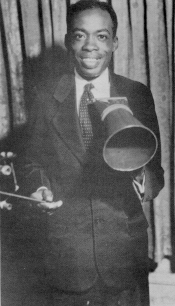 DeFord
Bailey was born in 1899 at Carthage, Smith County, Tennessee. His mother died when he was a little more than a year old, and his father's sister and her husband reared DeFord. Stricken with infantile paralysis at the age of three years, the bedridden child was given a harmonica as a means of amusement. Bailey overcame polio, although he had a deformed back and never grew taller than four feet, ten inches. However, his skill with the harmonica and his musical talent gained Bailey renown in the field of country music.
DeFord
Bailey was born in 1899 at Carthage, Smith County, Tennessee. His mother died when he was a little more than a year old, and his father's sister and her husband reared DeFord. Stricken with infantile paralysis at the age of three years, the bedridden child was given a harmonica as a means of amusement. Bailey overcame polio, although he had a deformed back and never grew taller than four feet, ten inches. However, his skill with the harmonica and his musical talent gained Bailey renown in the field of country music.
Bailey's impressionable years were spent around the rural communities of Newsom's and Thompson's stations, located near the railroad, where Bailey composed many of his tunes on the harmonica. He had to go under a train trestle on the way to school, and Bailey said he would wait for the train to go over; then "I would get under it, put my hands over my eyes, listen to the sound, and then play that sound all the way to school." Bailey became famous for recreating the sounds of rushing locomotives. During teenage years, Bailey worked for a white storekeeper in Thompson's Station and played the harmonica, to the delight of the customers and the proprietor. He remained with the storekeeper for some time before joining his family in Nashville, where he held several jobs. He continued to play the harmonica.
On December 6, 1925, DeFord won second place with his rendition of "It Ain't Gonna Rain No More" in a French harp contest on radio station WDAD. Soon after, Bailey made his first appearance on WSM Radio, after overcoming some racial opposition from the station's director. The young black performer was given the title "Harmonica Wizard."
Bailey played a role in the naming of the "Grand Ole Opry." In 1926, the WSM Barn Dance followed an hour of symphonic music, and one evening its programming concluded with a selection by a young composer from Iowa reproducing the sound of a train. Bailey opened the country music program with his rendition of "Pan American Blues." The difference in the musical genres caused the director, George D. "Judge" Hay, to observe, "For the past hour we have been listening to music taken largely from grand opera; from now on we will present 'The Grand Ole Opry.'"
Bailey toured with other stars of the Opry, including Roy Acuff, Uncle Dave Macon, Bill Monroe, and others. During his travels throughout the South in the 1930s, he was well received by the country music public, although racial segregation laws caused Bailey problems in hotels and restaurants. To get a hotel room, on some occasions either he posed as a baggage boy for the white performers or pretended to be Uncle Dave Macon's valet.
In April of 1927, Bailey teamed with the black Golden Echo Quartet to make his first recordings of "Pan American Express" and "Hesitation" for Columbia Records in Atlanta. The Columbia recordings were never released. Two weeks later he recorded eight titles for Brunswick label in New York. On October 2, 1928, DeFord recorded for Victor records during a Nashville session. "Ice Water Blues/Davidson County Blues" became so popular that the Victor label released it three times.
Bailey's popularity peaked and waned within fifteen years. During the height of his popularity, he was allowed a twenty-five-minute performance on the three-hour Opry show. By 1941, he was off the Opry and beginning a thirty-year career of shining shoes at his shop on Twelfth Avenue, South. Apparently, WSM dropped Bailey because of his limited repertoire and his failure to convert to new tunes and written music. Bailey denied that he refused to learn new tunes; he claimed that the audience and the director insisted on hearing the old tunes.
During the Civil Rights Movement of the 1960s, Bailey's career was remembered. He made an appearance on a local syndicated blues television show, "Night Train," and in 1965 he made a rare concert appearance at Vanderbilt University. He appeared on the Opry's oldtimers show in 1974 at the Ryman Auditorium. On December 14, 1974, Bailey celebrated his 75th birthday by appearing in the new Grand Ole Opry House and playing several of his old tunes. He played for the homecoming show on April 3, 1982.
DeFord Bailey died at the age of 82 on July 2, 1982. On June 23, 1983, the country music industry celebrated DeFord Bailey as the first African-American star of the Grand Ole Opry. The mayor unveiled a plaque in Bailey's honor, and a monument was placed at his grave site in Nashville's Greenwood Cemetery. Bailey's memorabilia was presented to the Country Music Hall of Fame and Museum.